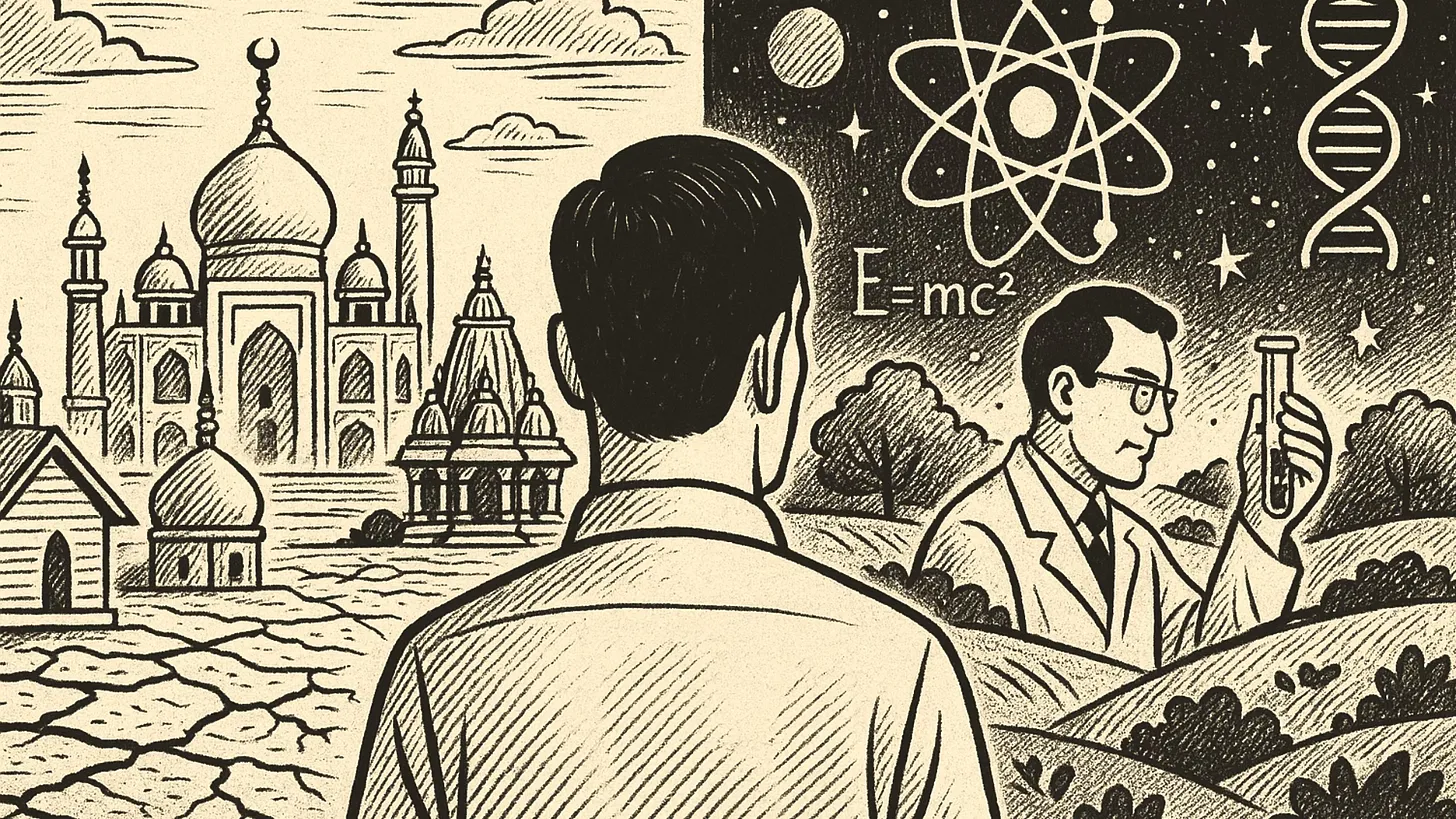- Phil Zuckerman on that World Happiness Report;
- A NYT article about alternatives to religion;
- Recalling mythos and logos;
- Richard Dawkins on how reality is so much more interesting than religion,
I’ve seen cautionary notes about this World Happiness Report on the grounds that the results are self-reported and based on only a single question (how happy are you?) on a scale of 1 to 10. At the same time, the report (at the link) seems exhaustive, in that the results are correlated with variables about GDP per capita, healthy life expectancy, social support, freedom, generosity, and the absence of corruption. And there do seem to be strong correlations between religious belief and non-happiness.
\

OnlySky, Phil Zuckerman, 18 Apr 2025: The happiest nations on Earth are strongly secular, subtitled “This correlation has staying power.”
Zuckerman is especially interested in this subject; written books like Living the Secular Life (which I’ve read and reviewed here) and What It Means to Be Moral: Why Religion Is Not Necessary for Living an Ethical Life (which I have but haven’t yet read).
He begins this article:
What happens when millions of people in a given society stop going to church and lose their faith in God? Does that society descend into despondency and despair?
Not according to the latest World Happiness Report, released last month.
Based on an analysis of a host of sociological, economic, and psychological factors, the nation that is currently the happiest on earth – for the eighth year in a row – is Finland. Following Finland, in the top five, are Denmark, Iceland, Sweden, and the Netherlands.
And it just so happens that all of them are among the most secular/least religious nations on Earth. All of these top-five happiest nations have experienced dramatic degrees of secularization over the last century.
Zuckerman goes on to understand that correlation is not causation, etc., and concludes:
There are certainly many reasons that these nations experience such high degrees of happiness and well-being. In addition to their strong social welfare systems mentioned above, they enjoy economic prosperity, healthy democratic institutions, equal rights for women, highly educated populations, clean streets, well-manicured parks, thriving arts, low murder rates, and – at least in the Nordic world – copious amounts of herring. But whatever the various reasons are that produce such happy societies, they don’t seem to be religious or spiritual in nature. Bible study, church attendance, prayer, faith – clearly such things can decrease and diminish, without causing widespread anguish or depression. Indeed, it seems that just the opposite can be the surprising result.
\\
The same day as Zuckerman’s piece was this:

NY Times, Lauren Jackson, 18 Apr 2025: Americans Haven’t Found a Satisfying Alternative to Religion, subtitled “Is it any wonder the country is revisiting faith?”
On Sundays, I used to stand in front of my Mormon congregation and declare that it all was true.
I’d climb the stairs to the pulpit and smooth my long skirt. I’d smile and share my “testimony,” as the church calls it. I’d say I knew God, Jesus Christ, the Holy Ghost, prayer, spirits and miracles were all real. I’d express gratitude for my family and for my ancestors who had left lives in Britain, the Netherlands, New Zealand and Norway to pull wagons across America and build a Zion on the plains. When I had finished, I’d bask in the affirmation of the congregation’s “amen.”
In that small chapel by a freeway in Arkansas, I knew the potency of believing, really believing, that I had a certain place in the cosmos. That I was eternally loved. That life made sense. Or that it would, one day, for sure.
I had that, and I left it all.
The writer maps her experience to the broader trend in America away from religion and toward the “nones.”
America’s secularization was an immense social transformation. Has it left us better off? People are unhappier than they’ve ever been and the country is in an epidemic of loneliness. It’s not just secularism that’s to blame, but those without religious affiliation in particular rank lower on key metrics of well-being. They feel less connected to others, less spiritually at peace and they experience less awe and gratitude regularly.
And of course how under the current administration, Christianity is privileged and encouraged. And how she read Richard Dawkins’ book The God Delusion — “It was an option not to believe.” — and later interviewed him by phone. And was dissatisfied with his answer to build community by playing golf.
In a country where most people are pessimistic about the future and don’t trust the government, where hope is hard to come by, people are longing to believe in something. Religion can offer beliefs, belonging and behaviors all in one place; it can enchant life; most importantly, it tells people that their lives have a purpose.
And concludes:
I recognize, though, that my spiritual longing persists — and it hasn’t been sated by secularism. I want a god. I live an ocean away from that small Arkansas chapel, but I still remember the bliss of finding the sublime in the mundane. I still want it all to be true: miracles, souls, some sort of cosmic alchemy that makes sense of the chaos.
For years, I haven’t been able to say that publicly. But it feels like something is changing. That maybe the culture is shifting. That maybe we’re starting to recognize that it’s possible to be both believing and discerning after all.
\\
I am reminded of this distinction. From a Google AI Overview.
In the context of philosophical and cultural transitions, “mythos” refers to traditional stories, legends, and myths used to explain the world and human experiences, while “logos” represents rational thought, logical reasoning, and systematic inquiry. The shift from mythos to logos marked a transition from relying on mythical narratives to employing reason and logic to understand the world.
Our modern world came to be through logos. Conservatives cling to mythos.
One of my essential themes here is that logos, properly understood, is much more fulfilling than mythos. Because logos is about the real world, while there are many, many kinds of mythos, most of them inconsistent; mythos is an artifact of human society.
\\\
And so Richard Dawkins — who has his own Substack now — responded.

The Poetry of Reality with Richard Dawkins, 23 Apr 2025: No Satisfying Alternative to Religion? Try Reality.
On April 18th, the New York Times published an article by Lauren Jackson called “Americans Haven’t Found a Satisfying Alternative to Religion”. It’s very long, but you can probably guess what she correctly lists as unsatisfying alternatives, failed attempts to fill the void of existential insecurity, the god-shaped hole: New Age “spirituality”, astrology, you know the kind of thing. She was kind enough to quote me, so I offer a brief response here.
I am sorry if there is, as she says, an “epidemic of loneliness”. But the remedy for loneliness is human fellowship, the warmth of real, live, flesh-and-blood companions and loved-ones; not prating in a vacuum to an imaginary friend for whose existence there is no vestige of serious evidence. Even an AI robot is better than that. At least ChatGPT exists, really talks back at you, will actually hold a friendly conversation. But talk to the imaginary friend which is God (Allah, Virgin Mary, Lord Krishna, Thor, Zeus, Mithras, name yours) and the only reply you’ll get is conjured within your own imagination. You’ll be talking to yourself, which is really rather sad, and hardly an antidote to loneliness.
The religious, I think, do not understand how many of us non-religious folks understand Dawkins’ perspective. They are alarmed about people who are not “loyal” to one religious tradition or another. Reality outside close human experience is irrelevant to them.
His themes in this piece echo those of his book THE MAGIC OF REALITY, from 2011, which I recently reviewed here.
There is joy in understanding, true joy, rising to little short of ecstasy. I suppose you could call it the poetry of reality. Peter Atkins concludes his lovely little book, The Creation, with a vision of the limitless future of science: “Complete knowledge is just within our grasp. Comprehension is moving across the face of the Earth, like the sunrise.”
You tumble into existence, open your eyes, come to consciousness, find yourself on a spinning sphere orbiting a nuclear furnace in one arm of a barred spiral galaxy, hurtling through spacetime alongside 300 billion galaxies. The fact that you exist at all is a piece of shattering good fortune. Not only did your parents chance to meet, not only did one particular sperm outrun 100 million rivals. The same massive luck attended every generation of your ancestors, back to a single Devonian fish and a greater distance beyond. Any slight deviation in what happened, anywhere, anytime, would have sufficed to throw your future existence off the conveyor belt of lucky contingencies. You certainly owe your existence to Julius Caesar, Napoleon, even Hitler, but less obviously to a humble peasant who didn’t sneeze at a crucial moment in some forgotten marital bed. You owe your life to a particular dinosaur, on a particular Jurassic day, who stumbled and failed to catch the ancestor of all the mammals. You are prodigiously lucky to be alive. So please stifle your entitled moaning. Revel in your own existence.
\\
And then Vox takes this subject on.

Vox, Christian Paz, 25 Apr 2025: Gen Z is finding religion. Why?, subtitled “3 theories for Gen Z’s return to God and faith.”
This concerns data trends that show the rise of the “nones” might be reversing
Starting in the 1990s, the share of Americans who identified as Christian, or identified with any religion at all, began to drop precipitously. At the same time, those with no religious affiliation — nicknamed “nones” — began to spike.
Americans have been steadily losing their religion entirely. They haven’t been converting to other religions, or getting religion later in life.
That trend might be ending. Over the last five years, the share of Americans who are “nones” has stabilized at roughly 30 percent, across multiple tracking surveys — largely because of one group: zoomers.
Sometime around or after the outbreak of the Covid-19 pandemic, young Americans began to find, or at least retain, religious belief at higher rates than previous generations. The numbers tell this story quite cleanly. While the share of “nones” jumped by about 40 percent from 2008 to 2013, the rise began to slow between 2013 and 2018.
Then, in 2020, it stagnated.
The three theories: a loneliness epidemic; a loss of trust in the establishment; a response or cause of younger people’s rightward political and social shift.
The piece concludes:
Whether these trends continue doesn’t seem guaranteed. If anything the data suggests we may have reached a temporary equilibrium in religious affiliation and belief that might change as older, more religious Americans, continue to pass away. The strongest social research suggests that biggest driver and predictor of continued religious identification is how religious your parents were — so if a more religious and faithful Gen Z ends up keeping that faith, and raising their children with the same norms, what looked like an inevitable and endless decline in American religiosity may have been less drastic than it appeared.
As usual I am always trying to look at the bigger picture. If Americans’ religious beliefs can be affected by social trends, then religious beliefs aren’t about apprehending reality, are they? Reality is not affected by social trends. They’re about expressions of human nature, refined over millions of years for survival. Humans live in cocoons of shared beliefs, because that’s how we survive. Survival is distinct from understanding reality.






